Key takeaways:
- Reparations advocacy emphasizes collective healing and justice through the acknowledgment of historical injustices and personal narratives.
- Training programs highlight the importance of storytelling, intersectionality, and strategic thinking in effective advocacy.
- Participants enhance skills in public speaking, research, and collaborative problem-solving, fostering community engagement and resilience.
- Future goals in reparations focus on nurturing deeper community connections, incorporating local histories, and promoting intergenerational involvement in advocacy efforts.
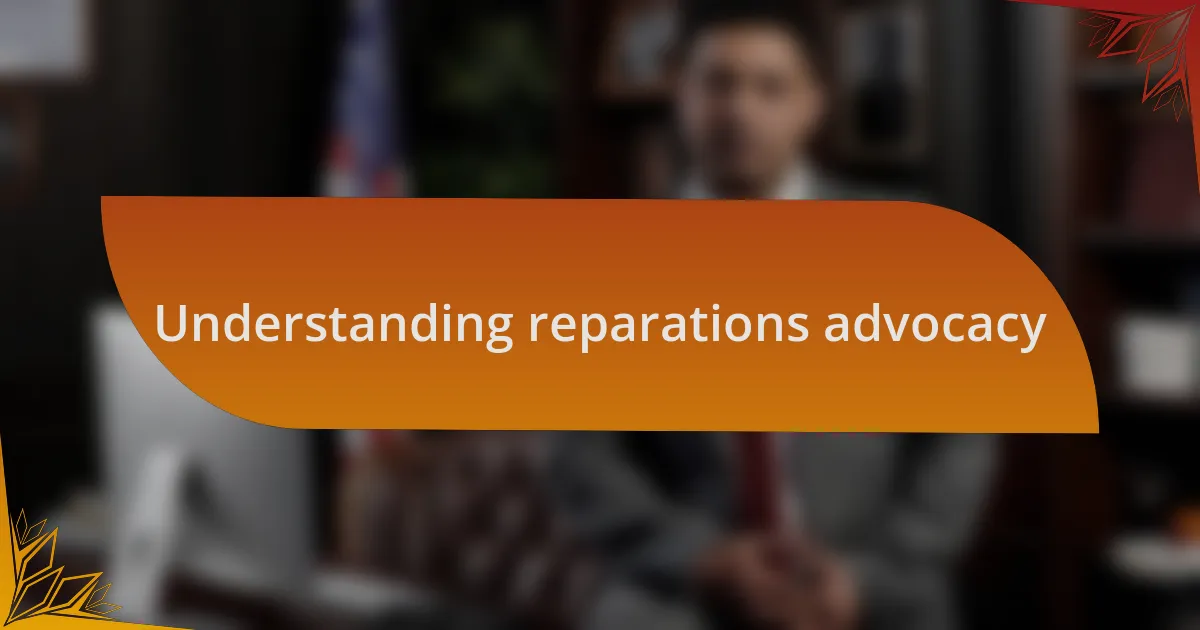
Understanding reparations advocacy
Reparations advocacy is a deeply nuanced movement centered around addressing historical injustices and economic disparities rooted in systemic racism. When I first delved into this topic, I found myself reflecting on the stories of my ancestors, whose struggles for dignity and recognition are often overlooked. How can we truly move forward without acknowledging the weight of their sacrifices?
Engaging in reparations advocacy has opened my eyes to the interconnectedness of our stories. I remember attending an advocacy workshop and hearing a participant share how their family had been impacted by discriminatory laws. It struck me: every personal story is a thread in the larger tapestry of this movement, illustrating the urgent need for collective healing and justice.
The emotional depth of reparations advocacy can’t be understated. It’s not merely about monetary compensation; it’s about restoring dignity and fostering understanding. I often wonder, if we laid bare these histories and listened with open hearts, wouldn’t we build a more just society together? Reactions can be intense, highlighting the necessity for education, empathy, and dialogue in this essential work.
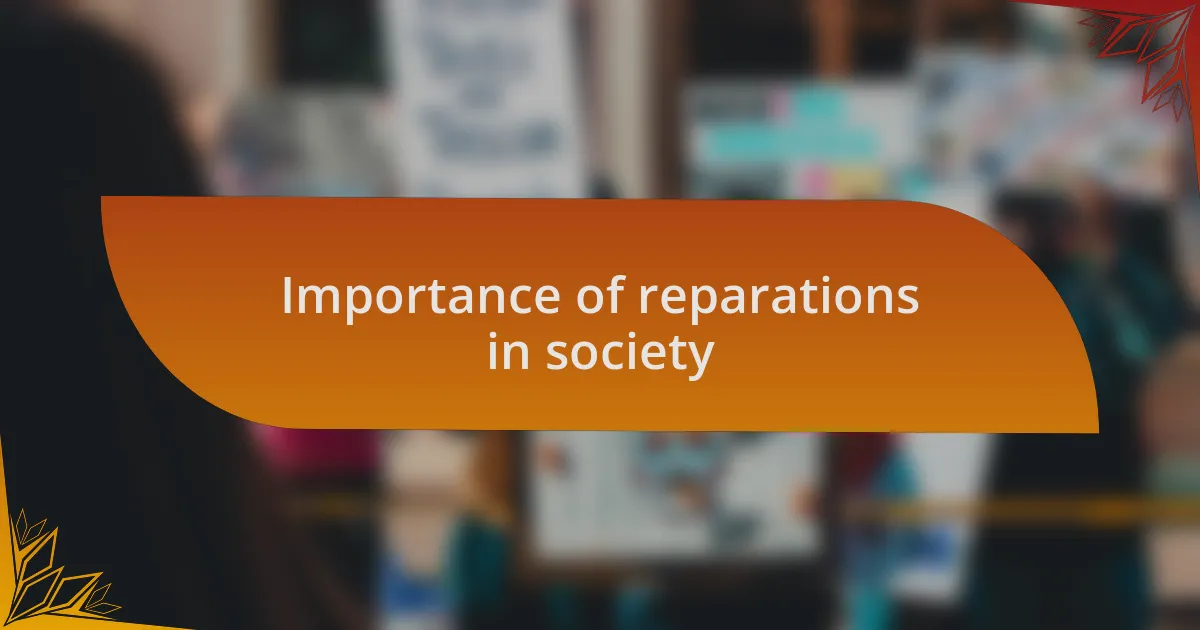
Importance of reparations in society
The significance of reparations in society extends beyond financial restitution; it embodies a commitment to acknowledging and correcting historical wrongs. I recall a conversation with a friend who had faced generational economic struggles, rooted in discriminatory practices. Hearing their frustration made me realize that reparations are crucial for not just healing wounds but also for empowering communities—giving them a chance to thrive instead of simply surviving.
Reparations also serve as a catalyst for meaningful conversations about race and justice. I remember feeling conflicted during a community meeting where the topic arose. It was uncomfortable yet enlightening, sparking debates that offered new perspectives and encouraged collective reflection. How can we expect progress without engaging with the discomfort of our past? These discussions reveal the intricate tapestry of societal injustices and challenge us to take actionable steps.
Ultimately, the push for reparations cultivates a broader understanding of social equity. It’s about creating a society that values every individual’s dignity and recognizes the implications of systemic inequality. My experiences in advocacy have reinforced the idea that these initiatives can foster reconciliation and pave the way for a more inclusive future. Isn’t it time we all contribute to that vision?
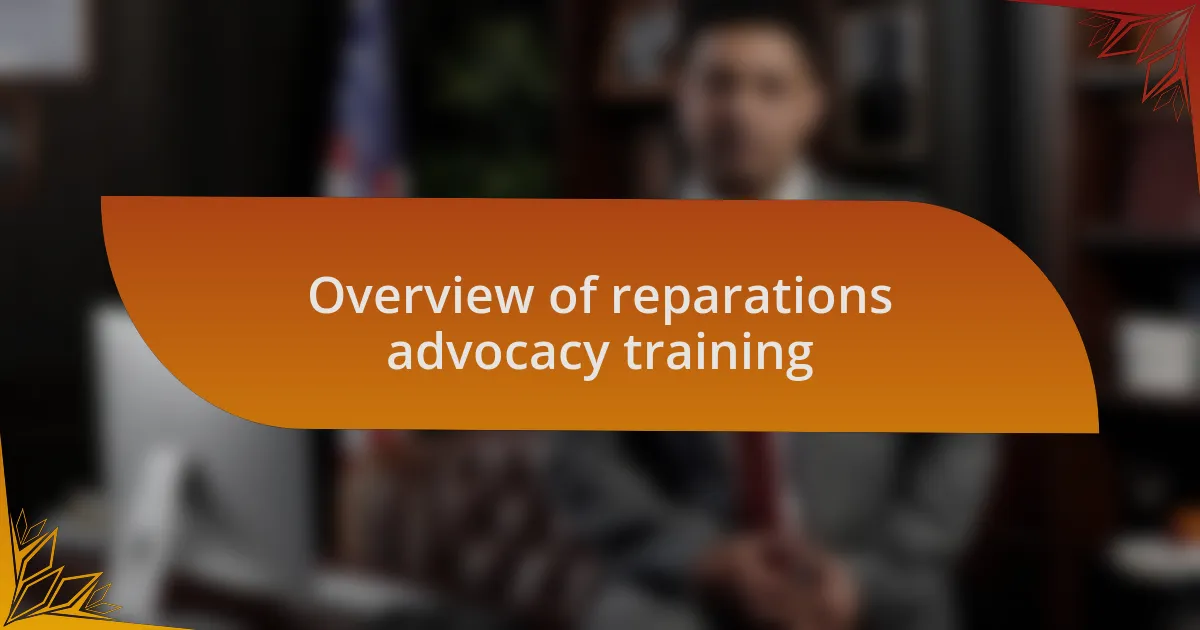
Overview of reparations advocacy training
Reparations advocacy training is an essential step for anyone looking to understand and promote justice in the context of reparations. I vividly remember my first training session, where the facilitator explained the historical context of reparations through personal stories and data. This immersive experience not only grounded me in the factual basis of the movement but also ignited a passion for advocating on behalf of those whose voices have been silenced for too long.
Through this training, I learned the various frameworks and strategies that can be utilized in our advocacy efforts. The hands-on activities, where we role-played real-life scenarios, made the theoretical aspects come alive. I found it transformative to discuss the implications of legislation and to consider how our actions could shape future policies. Have you ever thought about how knowledge translates into power? I certainly did—and it deepened my resolve to engage others in impactful dialogues.
Moreover, one of the most rewarding aspects of the training was connecting with like-minded individuals who share a commitment to social justice. Building relationships with fellow advocates nurtured a sense of community, as we exchanged personal experiences and strategies. There’s something both empowering and humbling about standing alongside others who are equally passionate. It made me realize that advocacy is less about individual action and more about a collective movement for recognition and justice.
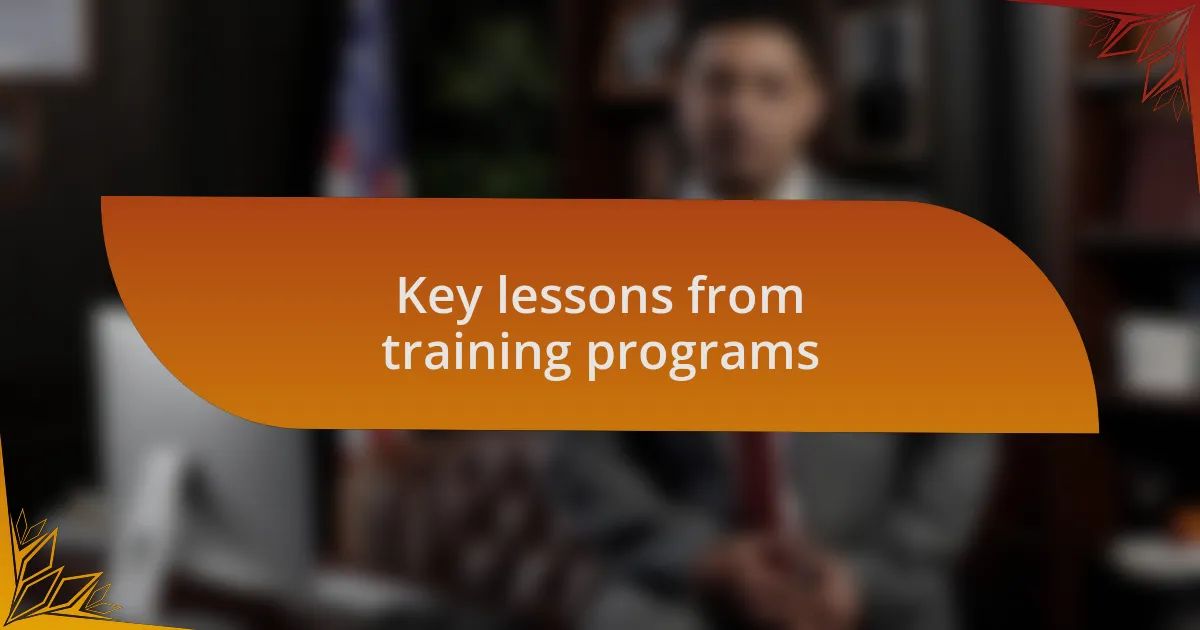
Key lessons from training programs
Within the training programs, one pivotal lesson was the importance of storytelling in advocacy. I remember participating in a session where we were encouraged to share personal narratives related to the reparations movement. It struck me how these stories not only humanized the data but forged deep emotional connections among us. Have you ever felt the power of vulnerability in a conversation? It became evident that authentic storytelling can dismantle barriers and foster understanding.
Another critical takeaway was the value of intersectionality in our discussions. I found myself reflecting on how the reparations movement intersects with various social justice issues, such as economic inequality and systemic racism. In one workshop, we analyzed case studies that highlighted these connections. This exploration broadened my perspective and helped me realize that effective advocacy requires a holistic view. Isn’t it fascinating how one issue can tie into so many others?
Finally, I discovered the necessity of strategizing beyond immediate goals. During a particularly engaging group exercise, we mapped out potential long-term impacts of our advocacy efforts. It made me recognize that while we may step forward for specific initiatives, our actions can contribute to a larger movement. How often do we think about the legacy we leave behind? Understanding the ripple effect of our work has inspired me to think about the future and the lasting change we can create together.
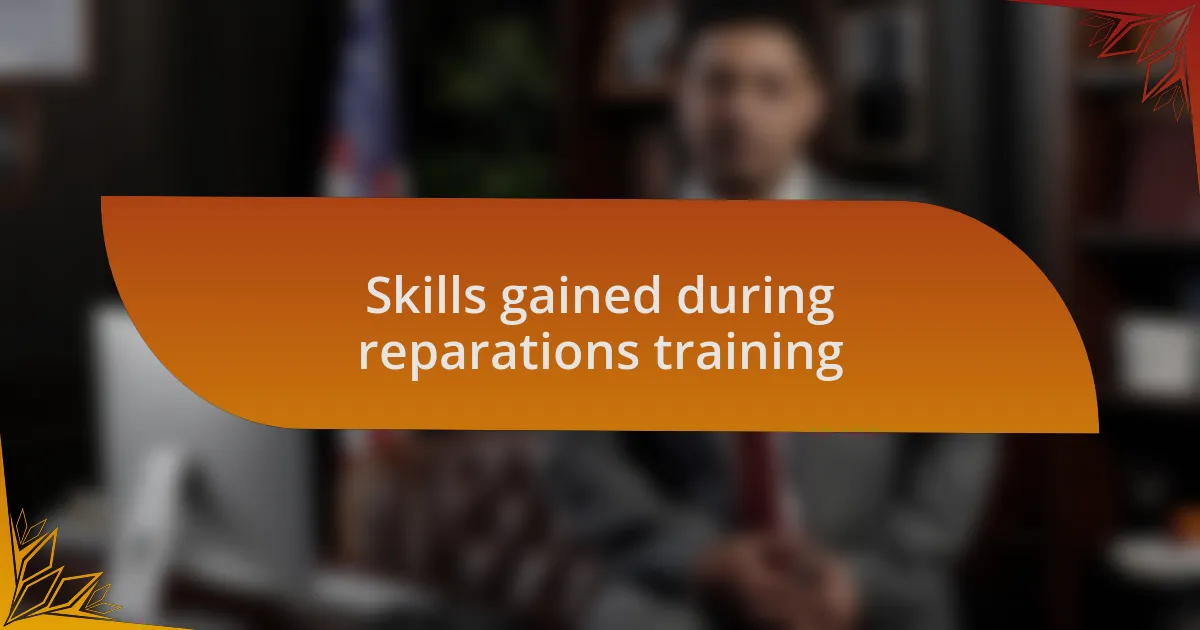
Skills gained during reparations training
One of the invaluable skills I gained during reparations training was the ability to engage in effective public speaking. I recall nervously presenting my viewpoint in front of the group, but by the end, I felt a newfound confidence. It was eye-opening to see how articulating my thoughts could not only convey passion but also inspire others to join the conversation. Have you ever noticed how a single voice can ignite a movement?
Additionally, I learned the importance of research and fact-checking in advocacy. There was a moment when a fellow participant presented a statistic that didn’t sit right with me. It motivated me to delve deeper and identify reliable sources to support our claims. This experience reinforced the idea that being well-informed can significantly enhance our credibility. How can we advocate for change if we don’t have solid evidence to back our assertions?
Moreover, I developed skills in collaborative problem-solving. During a breakout session, our small group faced a significant challenge in addressing concerns about reparations within diverse communities. The discussions became a brainstorming session filled with diverse perspectives. I realized that true progress often comes from listening and integrating varied viewpoints. Isn’t it interesting how collective wisdom can lead to more comprehensive solutions?
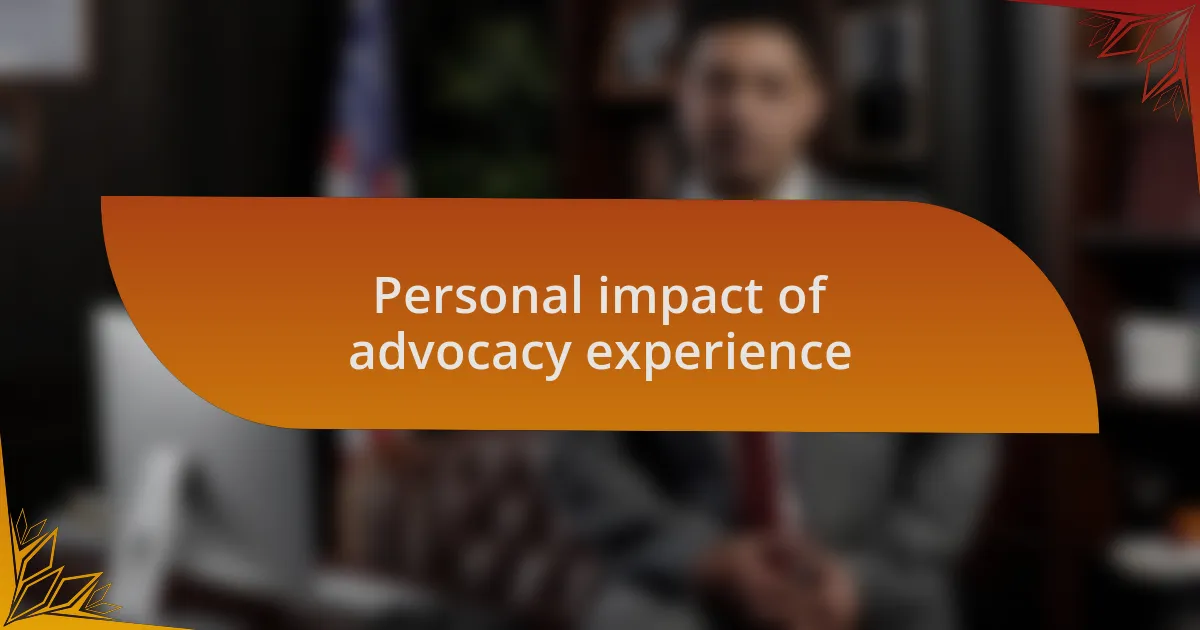
Personal impact of advocacy experience
Participating in the reparations advocacy training truly reshaped my understanding of community engagement. I remember one particular workshop where we practiced storytelling techniques. As I shared a personal story about my family’s history, I felt an emotional weight lift. This experience taught me how vulnerability can create deeper connections with others. Have you ever experienced the power of narrative to bridge gaps in understanding?
My ability to listen actively also transformed during this training. There was a powerful moment when a fellow advocate opened up about their experiences with racism and discrimination. Listening to their story brought a profound sense of empathy, reminding me that every person’s journey holds unique insights. Isn’t it amazing how understanding another’s lived experience can expand our own perspectives and encourage compassion?
Moreover, the advocacy training highlighted the importance of resilience in the face of opposition. I vividly recall a heated debate where our group faced pushback from skeptics. Instead of feeling disheartened, we rallied together, drawing strength from our shared objectives and commitment. This experience ignited in me a passion for tenacity in activism. How can we push for change if we waver in our resolve when faced with challenges?
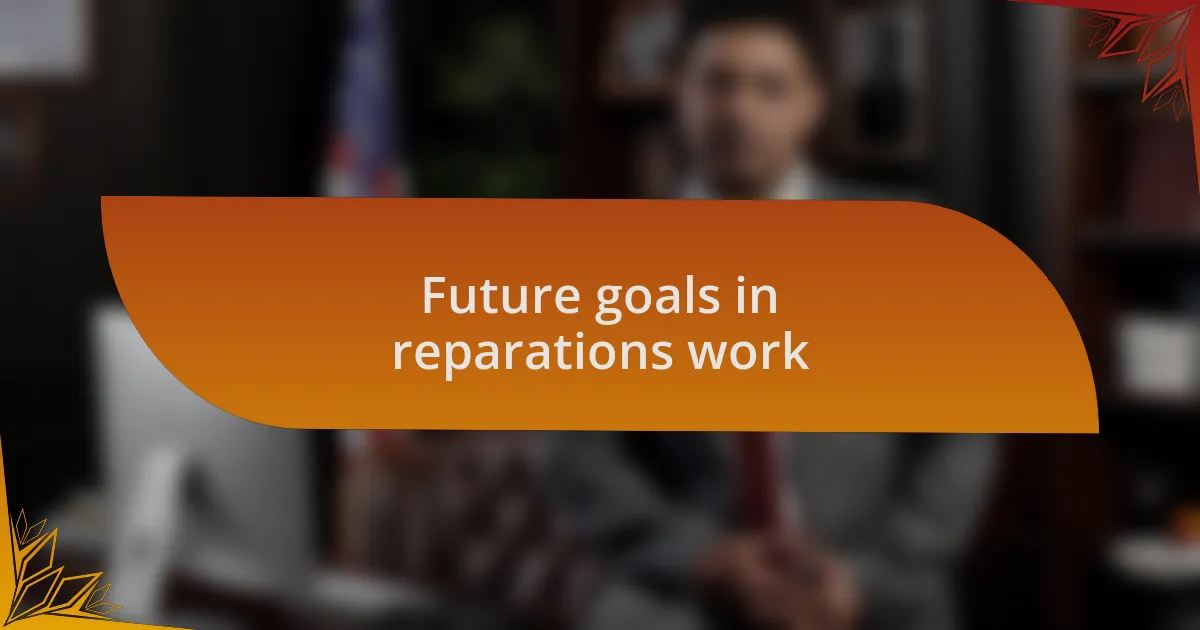
Future goals in reparations work
My future goals in reparations work are rooted in fostering deeper community connections. I envision workshops that equip people with the tools to tell their stories, much like the ones I experienced. It’s incredible how sharing our narratives can energize collective action. How often do we underestimate the profound impact of personal stories in galvanizing communities?
I also aim to expand the dialogue around reparations beyond traditional frameworks. During our training, I discovered the importance of incorporating local histories into our advocacy. By acknowledging and addressing unique regional contexts, we can create bespoke reparations initiatives that resonate more deeply with communities. Have you considered how the history of your own area could enrich the push for reparative justice?
Lastly, I hope to advocate for more intergenerational involvement in reparations discussions. Each generation brings different perspectives and experiences. I often reflect on a conversation with an elder who shared their hopes for future generations. Their wisdom reminded me that the fight for reparations is not just about the present; it’s about the legacy we leave behind. How do we ensure that the torch of advocacy continues to burn brightly for those who come after us?